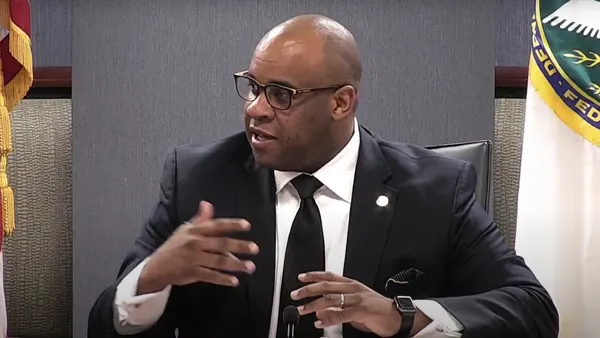Dive Brief:
- Many energy service companies (ESCOs) in New York are overcharging customers, moving state regulators to enact new rules that either guarantee savings or require a portion of the energy to come from clean sources, when the alternative providers are delivering energy, Syracuse.com reports.
- The Public Service Commission is conducting "an immediate audit" of ESCOs and has prohibited new ESCO contracts with residential or small commercial customers unless they either guarantee savings or source at least 30% of the power from renewable sources.
- The Public Service Commission, within 60 days, plans to review services which may benefit customers, such as aggregation or efficiency, and will allow those "deemed beneficial to be offered following the prohibition."
Dive Insight:
About 20% of New York's residential customers get their energy from an independent company, and the state has determined some portion of those ESCOs are overcharging. So in an effort to protect consumers, as well as wring some environmental benefits out of it, regulators are putting a hold on new contracts, auditing the system and developing new rules.
"We have zero tolerance for these unscrupulous companies, whose business model is to prey on ratepayers with promises of lower energy costs only to deliver skyrocketing bills," Cuomo said in a statement. "These actions will root out these bad actors and protect New Yorkers from these unfair and dishonest tactics."
The Public Service Commission is conducting an audit of ESCOs and has blocked new contracts "unless they provide guaranteed cost savings, or at least 30 percent of the supply comes from renewable energy." Regulators also say they intend to strengthen the process for revoking ESCO eligibility to do business in New York, and instituted a "do not knock" rule to protect customers, similar to "do not call" provisions.
"A company's ability to do business in New York will be revoked if they ignore local solicitation rules regulating door-to-door selling at a residence or place of business," the PSC said.
The PSC will also consider whether its financial penalty authority, which allows for a penalty of up to $100,000 a day per violation, should be applied to ESCOs, and whether the companies should be required to post performance bonds to be used for penalties or refunds.
Regulators are also considering extending the time by which a residential consumer can cancel the contract with a company after the contract has been received.
The changes follow a review of the system, which revealed significant overcharging in some instances. The PSC said it found:
- Four companies in the Hudson Valley charged more than double what Central Hudson charged for electricity, and another charged triple the utility rate for natural gas;
- a New York City company charged more than triple Con Edison's rate for electricity and several companies were charging more than double the utility rate for natural gas;
- several ESCOs in Upstate New York charged more than double the National Grid's electric rate;
- and, a variable rate plan of a company in the Finger Lakes region was eight times what Rochester Gas & Electric charged for electricity.














